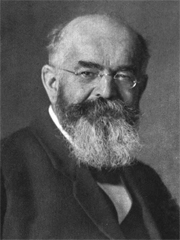Rig Veda ~ Nature
Adolf Kaegi (1849 - 1923) Swiss Indologist and Graezist said:
“Rig Veda is permeated by a lively sympathy and love of nature.”
| Adolf Kaegi studied ancient languages and indology, focusing on the study of Greek and Sanskrit .
Among his academic teachers were Rudolf von Roth and Karl Geldner .
In 1875 Kaegi became a private lecturer for Old Indo after graduation and postdoctoral studies,
and in 1878 Kaegi presented a study on the song collection Rig Veda .
In 1883 he was selected as an extraordinary professor of
"Comparative Linguistics, with special regard to Old-Indian and Greek"
at the Chair of Comparative Linguistics of the University of Zurich under Heinrich Schweizer-Sidler.
In his ten years as an extraordinary, Kaegi dealt mainly with ancient Greek.
He reworked Gustav Eduard Benseler's Greek-German dictionary and Georg Autenrieth's dictionary on the Homeric poems.
He also wrote a Greek-German school dictionary and exercise books for school use.
His principal work was the short-syllable Greek school grammar, published in 1884,
which is still one of the standard works in an edition revised by Eduard Bornemann at the Faculty of Philosophy.
In 1893, Kaegi became the successor of the Swiss Sidler as a professor for Sanskrit,
Indo-European and Classical Philology . As a result of a severe illness,
Kaegi had to restrict his teaching activities from 1912, before he succeeded Eduard Schwyzer
as a full professor in 1914. Toward the end of his research, Kaegi turned to Indology again.
In addition, he served as a member of the "Executive Committee" of the Swiss idiot,
from 1901 to 1922 , which he also presided over from 1917 onwards.
Adolf Kaegi died after a long and serious illness in 1923 at the age of 72 years. || Source: The Rig-Veda, the oldest literature of the Indians
Publisher: Kessinger Publishing, LLC (2006)
ISBN-10: 1428626670 ||





